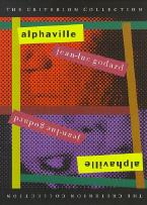| |
|
|
| |
1. Jody
Patterson
|
|
| |
 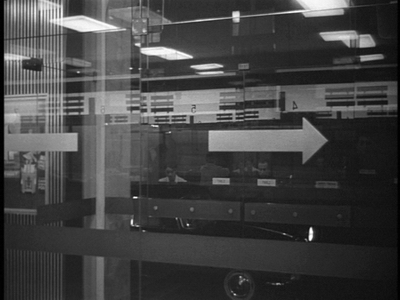 
Proposed question: What is the symbolic
importance of arrows in Alphaville?
Image 1 is the opening scene of the film, the
first indication of what is to follow. As the plot develops it
is easy to forget this initial symbolic reference, and so the arrow
is repeated in various scenes to follow - sometimes as part of
a larger picture (Image 2), or later re-appearing alone, starkly
outlined against the black screen so it cannot be missed (Image
3).
The arrow is an ancient, perhaps universally
legible symbol. It is an indicator of movement in a specific direction,
and sometimes an emblem of readiness for war. In both these symbolic
senses the arrow signage in Alphaville is a reminder of the underlying
plot, as dictator/computer Alpha 60 prepares for war against the
rest of the galaxy and his unquestioning subjects follow.
The repeated arrow signage is a symbolic reminder
of how society operates in Alphaville . The arrow is unambiguous
and unforgiving: you either follow as it dictates, or you do not.
Following is a fact of life – indeed, not following orders
and directions and imposed prohibitions is punishable by death,
in a bizarre swimming-pool ritual.
The arrow is a metaphor for life without choice,
without asking questions. The slogan “never why, but because” is
embodied in simple graphic form by these arrows. This signage never
indicates a destination, only a direction: such is life in Alphaville.
Its immediately legible form provides all the information necessary
to proceed without evaluation of one’s surroundings, without
thought. If one does not desire to know why, but only because,
then the arrow can replace all the choices made in a day, perhaps
even a life. |
|
|
| |
2. Joel
DiGiacomo
|
|
| |
 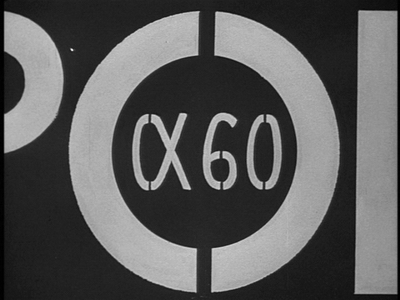 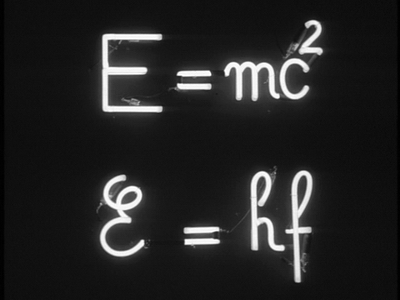
Each of these 3 images is an example of the
way Godard constructs his dystopia. Lacking elaborate sets, he
focuses on key images to suggest a general condition. In this case,
traffic control, computer signage, and neon declarations of rational
truth present and define alphaville. The first underlines prudence,
the second is a symbol of the power of science and technology,
and the third, logic, all of which are part of Alphaville dogma.
Syd Mead, in his interview with Jean-Éric
Hénault, mentions that to be convincing, a futuristic scenario
needs to include all elements of real life, in detail. Godard,
on the other hand, choses only a few important, characteristic
details, and leaves the viewers to interpolate, or to imagine,
the rest of that world—the whole picture—for themselves.
Although these images are neither entirely foreign, or particularly
strange on their own, Godard still manages to create a distinctly
negative impression of Alphaville. The images are bold, harsh,
imposing, and reduced to their essential, simplistic elements,
devoid of all complexity, precisely reflecting the director's view
of domineering, totalitarian societies. The audience is denied
any general perspective, leaving them without a comfortable point
of reference, which creates a subtle sense of tension and uneasiness,
as one would likely experience if they were to live in such a society;
they know something is amiss, different, or wrong, but
they can't grasp exactly what it is, so they might as well continue
to believe what they are taught. Furthermore, the controlled, sequenced,
and narrow portrayal of Alphaville that is offered to the viewer
in this manner, mimics Alphaville's indoctrination of both its
visitors, and its citizens. |
|
|
| x |
3. Collin
Gardner
|
x |
| |
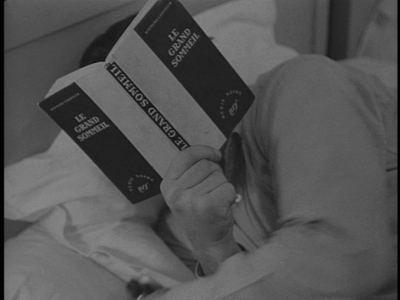   |
|
| |
4. Suzanne
Gibson
|
|
| |
  
In Alpha Ville individuality is forbidden and
a totalitarian system of governing rules all aspects of life. It
is a city ran by a computer, the city itself takes on a likeness
to a computer. The citizens of Alpha Ville are denied complex emotions
as well as any thoughts of past and future, the only time in Alpha
Ville is the present. Upon entering the city one is faced with
a sign that reads, ‘Alpha Ville: Science. Logic. Security.
Prudence.’ This sign is one of the most primitive forms of
propaganda, as it reinforces total control, before entering the
community, the ideologies of the city are enforced before even
entering into the city itself. The director uses signage as a means
to present some details and description of they type of city one
is entering, yet the view is still left with little information
and must figure out the complete mean of the sign as the movie
progress.
Control is a key component of the cities structure.
The states views are established by repetition rather than verification,
and signage in the movie is no exception. If repeated frequently
enough a new ideology will replace former views. The director uses
signage as a means to highlight and enforce totalitarianism, in
this form psychological control. The sign that reads ‘the
world’ not only indicates that this city is the center of
everything, but also suggest that there is nothing beyond. The
unfamiliar in a fearful thought, and many would prefer to accept
the known rather then venture into the unknown, by labeling the
city of Alpha Ville as the world lessens the potential for one
to question what is beyond, and hense the average citizen is satisfied
with their current standards of living. This particular sign is
garish, jarring, imposing, it is devoid of complexity, Alpha Ville
is the world, and it is not a question rather a statement. There
is a level of control that is designed to influence the attitudes
and behaviors of the mess population.
As a means to mobilize the entire population in
support of the state, the ‘Ministry for Dissuasion’ keeps
in check all unorthodox or potentially subversive thoughts that
threaten the totalitarian government. When the viewer is introduced
to the Ministry for Dissuasion the voice over justifies it as, ‘the
essence… of the so called capitalist world… or the
communist world… but simply the natural ambition of any
organization… to plan all its action… to minimize
unknown quantities.’ This purely rational approach removes
discards all emotions such as freedom, love, and happiness, all
of which are removed from language to become non-existent, and
if used are punishable by execution.
Totalitarian control is a result of directly influencing
the opinions and behaviors of the mess population, the director
ignores cause and effect, he is not interested in context rather
then demonstrating the result. |
|
|
| |
5. Vera
Guo
|
|
| |
 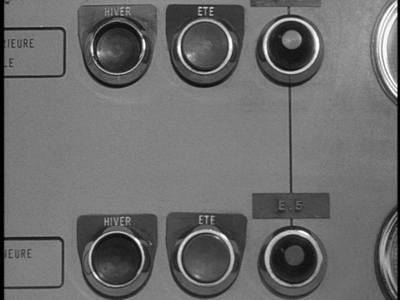 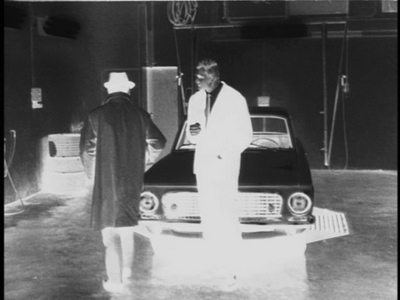
The three images shown in my question were all
flashes of a certain image. All three were sudden glimpses of one
scene. The flashed images reference pop culture, and the negative
inverted images are used to create a state of confusion or that
it is referring to something bad about to happen. It is the opposite
in the way Alphaville runs in which cause and effect no longer
apply, the images that are flashed are the causes and effects of
the preceding or following scenes. The first image happens before
Lemmy Caution stabs the guy in the telephone booth. The flash of
the knife is displayed in a way in which it is the first time that
it is clear how he killed the man yet we do not see it happening.
The other killings are not very clear. The second image is after
he kills Alpha 60 and Professor von Braun in which the second image
is flashed in an effort to explain the situation of the city and
how Alpha 60 controlled the weather and that it is no longer summer
or winter. In the last image, it is before he shoots and runs over
the man with his car. The image that happens before it is inverted
alarming the audience in what is about to happen.
These flashes of images create bizarre circumstances
in which the actions take place although the whole movie is a bizarre
circumstance. These images are also all under the idea of control.
In which the detective always carries a camera and takes pictures
of random things believed to be of unimportance but he could use
to his advantage. These images are significant in that they tell
so much within one frame. The second image could also represent
the control in which Alpha 60 has over the city’s weather,
removing summer and winter in order to reduce the emotional effect
from changes in temperature. The control of the individual with
the use of technology. In the last image, it is how Lemmy Caution
always has control over the situation in which ends in acts of
violence and murdering somebody. |
|
|
| |
6. John
Lee
|
|
| |
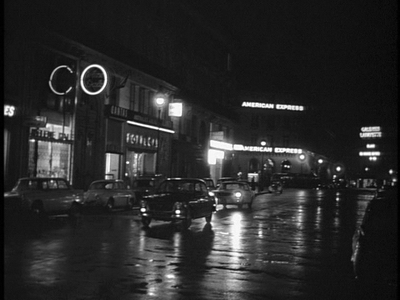 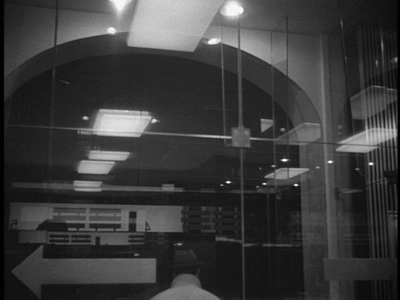 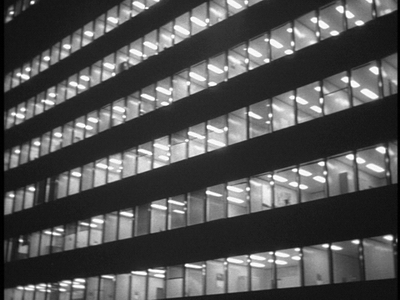
Godard's articulation of Alphaville's dystopic
inhumanity through architecture contemporary to the viewer facilitates
his social commentary and anachronistic interpretation of time. Therefore,
the three images – a typical streetscape, a renovated lobby,
and a Modernist facade - represent an architectural progression,
one that parallels the logical progression in the plot, and is critical
to an understanding of the film at the level Godard intended.
Johnson/Caution is initially confused with the
lack of human emotion in the characters he encounters and specialized
social organization; the non-existence of these nuances propels the
disappearance of the nuances of the streetscape in the first image
throughout the course of the film.
In the second image begins to introduce elements
of modernity, replacing idiosyncrasies where they may once have existed.
More significantly, however, the image captures the futility of the
scene (for nothing has really been accomplished), and, through opening
and closing the scene with the arrows on the doors, an anachronistic
feeling – deja vu.
The final shot synthesizes these main ideas: by
showing the clip twice, the anachronism (and consequential deja vu)
of the film is underlined; the context of the scenes (the first narrated
by Dickson, who says that he “can't get used to living here”,
and the second revealing it as Alpha 60) reinforce the relationship
between architecture and inhumanity.
The surreality as a result of the use of contemporary
French architecture (from the sixties) may be attributed to the anachronism
inherent in the immediacy of the future he portrays. Godard suggests
to the viewer, by exploiting the heartlessness, oppressiveness, and
inhumanity of modern architecture, that they may already be living
in a technocracy, an Alphaville. It is a social commentary that engages
the viewer; indeed, combined with the sense of inevitability – bred
through repetition and symbolism, such as the prevalence of the arrow
- makes him downright uncomfortable. |
|
|
| |
7. Nu-Ri
Lee
|
|
| |
 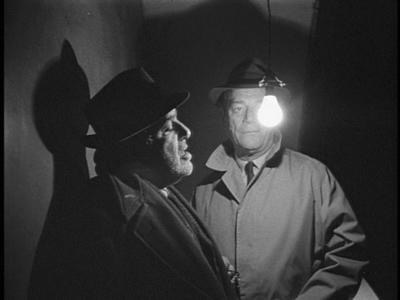 
In the film Alphaville, use of light is very different
from what we have seen through the other movies. In movies like Cabinet
of Dr. Caligari and Metropolis, the light represents good and the
dark/shadows represent the evil, but it seems that in Alphaville
it is the opposite. The light brings dystopia and disorientation
to the film and in fact it is the film’s only nemesis to the
well-being and freedom of the characters in the film. The first image,
representing the ultimate power, the computer Alpha60, is a light
with a fan that rotates. It is that light that controls the people
in the dark/shadows who are being brain washed by this computer/light.
Instead of the light being the epitome of the good, the light has
turned into a sort of ‘Big Brother’ from Orwell’s
1984. The characters in the film no longer had any choice of freedom,
they were being constantly tested by this light and their fate was
decided by it. It seems as though, that the light now represented
the good going through a power trip where the good is more evil than
any evil itself.
In Alphaville, where there is light, it is dangerous,
the second image shows Lemmy Caution (Johnson) and Dickson talking
about the creator of Alphaville in front of the naked bulb. Because
light is associated with evil in this film, a fear is embedded to
the scene, even though that shot is brightly lighted and the faces
of the characters are keenly shown. When the characters are talking,
it seems as thought the naked bulb act as a microphone and feels
like someone or something is listening in. Maybe that is why, when
Lemmy and Dickson swings the light around, it feels more comfortable
because as long as they are safely in the dark, the light/alpha60
won’t kill them.
The third image is where Lemmy is going up the
staircase of the Alphaville headquarter, and the light is reflected
through the staircase glass and doors. The glare is disorienting
and creates a thrill. The lights in the stair way seem to act like
security cameras as Lemmy is on his way up. It becomes evident that,
maybe the scene is purposefully glaring and not showing the lights
straight on is because its power is diminishing. It acts as a foreshadow
in the film that the creator of Alpha 60 will be eliminated along
with his creation. It is very unsettling to have a film that portrays
light as evil, for we are all accustomed to think that light is always
good. |
|
|
| |
8. Michael
Lin
"What have they done?" -- "They
behaved illogically."
In the mechanized totalitarian world of Alphaville,
the people are reduced to numbers and variables in a complex mathematical/scientific
equation. The contact between the masses is stripped of emotions,
devoid of love and feelings. They are reduced to predictable, impersonal
interactions based on machine logic. Greetings are prescribed responses
that don’t necessarily relate to any conversation, and not
truly reflective of anyone’s condition, “I’m
very well, thank you, you’re welcome,” is just a soulless
utterance. As if the people, like a malfunctioning robot, were
programmed to say this one thing even under inappropriate circumstances.
Conversations are often emotionless like (with the benefits of
hindsight) an instant message of our day. The seductresses of the
hotel repeat the same questions even when no response is clearly
intended, “You’re tired, sir?” The role of women
in this society is simply for pleasure. Furthermore, they have
classing systems or levels as if in a computer game.
Disjunctions and chopped up scenes that seem
to skip internals appear as if entered into a computer program
and diced up, edited, and rejoined. Conversations sometimes skip
ahead as do scenes that are discontinuous in the same way a comic
strip narrative is carried out. With all the conscience and emotions
wiped out of the general population, the routine of everyday people
supposedly falls into a logical machine pattern, a calculable matrix
of possibility. Any means to break from the system in pursuit of
love, art, or individual consciousness is punished by death. Thus
when Lemmy Caution asks about the shooting of the citizens who
show signs of passion and feeling such as crying for a wife’s
death, he is answered with, “They behaved illogically.” Here
the logicality of the machine is polarized against the illogicality
of human emotions. Although, it can be argued that human emotions
are illogical or can drive people to do illogical things, there
is often a degree of judgment or tolerance involved such as allowing
time to grieve and the letting out of anger. Here Godard plays
with an idea about human passions that can relate to anyone in
the present or past. By taking the idea of the illogicality of
human emotions and outlawing them completely creates a strange
universe that, just like Alphaville itself, is just a rearranging
of a world which is not too much different from the reality of
a present day (in this case 1965~). The pop art and pulp fiction
references, nocturnal shots, neon signs, and modern architecture
are used to create this dystopic atmosphere. Elements which are
familiar to the audience, but used in isolation generate a unique
experience. In the very same way, the movie’s story, dialogue,
and human interaction, rewired and edited with a computer logic
seems highly illogical and unusual to the conscious audience.
The response, “They behaved illogically,” beckons
audiences to reexamine a fact taken for granted of human nature;
the very emotions that we experience from day to day, and wonder
what would happen if the film were a reality. |
|
|
| |
|
|
| |
9. Veronica
Lorenzo-Luaces Pico
"That is not a Bible. It's a dictionary."
There is a lot that can be said about this quote.
The Bible historically has been THE book by which millions of people
live their lives. It is where they learn all their knowledge from,
the way they must behave, the way they must dress, where they came
from, where they go, as well as who they are as individuals. The
Bible contains very ancient information that has been able to transcend
and live through the centuries due only to the fact that it is
written on the Bible.
But the Church, which was the ruling power at
the time, wrote the Bible. More specifically, men wrote the Bible.
It could have been written by any of us. Those men decided what
became world knowledge and what was lost in the pages of history,
forgotten by time.
In this way, the dictionary is like the Bible.
A Group of men meets together and writes it, making it the universal
rule and giving meaning to our words.
In the movie Alphaville words start to be banned
from the dictionary, so they are not defined in it anymore. By
doing this, the ruling power dictates who we are because we can
no longer express a feeling with words, if we cannot communicate
our ideas.
I would also like to point out that it is very
interesting how in different languages we can express our ideas
differently, and it feels like sometimes one language is able to
project what we are trying to say in a better way. Sometimes a
particular language has many words with slightly different connotations
for a particular word that appears only once in another tongue.
In that sense, if language is born from the people, then the fact
that they lack a certain word reveals who they are.
This quotes talks about the power inherit in
language. It is like the Bible in its ability to shape and give
meaning to a specific society. |
|
|
| |
|
|
| |
10. Arjun
Mani
"An order is a logical conclusion.
One must not be afraid of logic. Simply that. Period."
Alphaville presents a surreal and dystopic
view of a familiar fascist world set in a futuristic sci-fi context.
Functioning within the restrictions of a technocratic dictatorship,
the world of Alphaville operates in many ways like George Orwell’s
fascist future of 1984. Akin to Big Brother, Alpha 60
is the sentient logic driven computer running the world with a “Marxist-Nihilist” complex.
Like Orwell’s book, this scenario speaks strongly to the
dystopic realities presented by the objective, and pseudo-logical
sentiments of fascist ideology.
This quote captures the essence of this imperfect
ideology, emphasizing the imposition of cold logic onto a more
or less naturally irrational world. Alpha 60, Like 2001: A
Space Odessy’s HAL 9000, knows what is best for the
collective, and through extensive objective deliberation, issues
orders that all must follow without question. Alpha 60’s
credibility is based on a primary principle that Alpha 60 is infallible,
and hence its logic and orders are gospel.
The use of the word “order” alone,
establishes an authoritarian presence. Alpha 60 orders that “One
must not be afraid of logic. Simply that. Period”, yet it
is logical that a people ruled by an iron fist are a people in
fear of it. Their fear is transformed into an unattested loyalty,
and eventually unattested yet unsubstantiated faith. For example,
in 1984 we are told “there is no love, other than
love for Big Brother”, or rather “love Big Brother
or die”. Even Winston, the story’s hero, cannot escape
this imposed control. Similarly, Hitler’s propaganda-man,
Josef Goebbels, broadcasted Nazi ideology using this brand of imperfect
pseudo-logic to rationalize overzealous ethnocentricity.
In a sense, however, the logic of Alpha 60 and
HAL 9000 is not flawed, but is incongruent to the human context.
Lemmy Caution is the irrational human element introduced to the
world of Alphaville, ultimately corrupting it, leading to the demise
of Alpha 60, and the general disorientation of its enslaved subjects. |
|
|
| |
|
|
| |
11. Darcy
McNinch
"No one has lived in the past or
will live in the future. The present is the form of all life."
This line or a form of it is repeated throughout
the movie by the inhabitants of Alphaville; although it may appear
frightening when uttered in the film it is undeniably true: one
cannot live in the past or future, only the present exists. This
idea is also reflected in the use of the sets, the entire film
was filmed in contemporary Paris despite the fact that the film
is set in the futuristic city of Alphaville . This makes the idea
of the present being the form of all life stronger. This is now
and this is what is happening. It is much more realistic than the
fantastic space age sets in some films. The problems of the future
are located in the present day.
“The present is all one can know in life.” The
people of Alphaville are meant to become devoid of emotion and
part of this is not worrying about the future or regretting the
past, neither exist, only an emotionless present is important in
which logic, technology and organization rule. If time moves in
a circle and everything has already been said and done than there
is no point in waiting for it to happen again or looking back at
it longingly, looking back is dangerous.
Speaking of one’s past is forbidden, to
mention where you are from or where you are going is unnecessary,
especially as in the case of Natasha, when Lemmy tells her she
was born in the Outerlands and not Alphaville. The people of Alphaville
our confined by this notion of nowness that they live in, they
are consumed with an inability to look back and destroyed by their
lack of for-sight.
The quote, first spoken by Natasha demonstrates
how brainwashed the people of Alphaville have become. They have
lost their ability to express themselves in any way. The quote
shows the contrived world’s lack of excitement, longing or
regret – it is a world of logic, in which anything but logic
is denied and removed from society. This line makes it apparent
that no further thought of what has been or will be is needed. |
|
|
| |
|
|
| |
12. Ben
Nielson
"All things weird are normal in
this whore of cities."
“all things weird are normal…”
Alpha-Ville presents itself as a city of pure
rationality. What is normal, then, in Alpha-Ville, is decided based
on rationality devoid of emotional or traditional influence. The
opinion that “all things weird are normal…” implies
that some of the accepted mores of Alpha-Ville, mores developed
through pure rationality, are alien to the traditional emotion-based
moral values of our cities. This hyperbolized Enlightenment-stream
forecast, this theoretical city based on the realization of pure
logic in political organization, produces its dystopic effect by
re-evaluating our societal faith in the inherent promise of science,
logic and reason. We live in a society that is constantly progressing
based on advancements and dedication to science – to have
the promises of science resolve into Alpha-Ville is to have the
core values for progress in our society thrown back in our faces;
suddenly we are no longer part of a society of constant progress
headed for increasing improvements in quality of life – we
are stuck in a social machine churning towards this theoretical
doom. “all things weird are normal…” then, in
the context of this film – is a half sentence that effectively
summarizes the nature of the films dystopic effect, turning on
our societal faith in logic as a tool for progress.
“…in this whore of cities.”
The first half of the quote summarizes Alpha-Ville’s
nature as the metaphoric hyperbole of the resolution of logical
political evolution; the second half establishes the protagonist
as a man of tradition and his opinion of Alpha-Ville – by
having him drop a casual bible reference. The “whore” of
cities, in scriptural reference is the common interpretation of
the whore of Babylon . In that scriptural reference, detailing
the religious apocalypse of mankind, the whore of Babylon is said
to, ‘reign over the kings of the earth.’ Alpha-Ville
clearly doesn’t hide its position of rulership over its residents
It also admits freely its plan to make war on other enclaves until
Alpha-Ville and its residents are the sum total of mankind. This
quote however, casts it in the role of mankinds destroyer.
“all things weird are normal in
this whore of cities”
This quote reveals early in the film that our
protagonist understands the gap between mores based in a combination
of emotional and rational values, and the purely rational value
system of Alpha-Ville; it also reveals his traditionality and his
positioning of Alpha-Ville as the greatest enemy of Mankind. |
|
|
| |
|
|
| |
13. Uros
Novakovic
" "WHY" -- what does that word mean? I forget."
The above quote is first uttered by Lemmy Caution’s
Russian informant/friend (Dickson?) as they meet in his inexpensive
hotel room. The sentence, which is emphasized and repeated in Russian
language, carries considerable philosophical connotation. The subtext
of the question concerns the nature of the society without the
word why, that is a society without questioning. However, initially,
the meaning is unclear. The quote seems to an indication of the
lack of questioning within the technocratic Alphaville.
As the film progresses more information is revealed
and the meaning of the quote changes according. The final meaning
is continually postponed, as the totalitarian features of Alphaville
are exposed. Eventually, as the condition of forbidden words is
explained, the seemingly figurative nature of the quote assumes
a surprisingly literal character. The movie returns to the theme
of the original quote in one of the final sequences, when Caution
and Natascha are talking in his hotel room. Crucially, Natascha
uses the word why, to which Caution cautions the viewer. At this
point however, the meaning Is no longer unclear, the viewer has
a complete understanding.
The word ‘why’ is, in fact, a forbidden
word in Alphaville, as it indicates a condition of uncertainty,
that is inconsistent with the absolute technocratic nature of the
city ruled by Alpha 60. Theoretically, a superior intelligence
is capable of predicting everything. In conversation; the word ‘why’ it
is to be replaced with ‘because’. “Never ‘why’,
but ‘because’.” |
|
|
| |
|
|
| |
14. Michael
Taylor
"The meaning of words and expressions is no longer grasped."
Just as in the quote regarding the absence of
a bible with the replacement of a dictionary, Alpha 60 has established
it necessary to eliminate the need and want of the human form for
poetics and seeks only rationalist philosophy. Love has been deemed
unnecessary and through its abolition we can see the machination
of social encounter and daily life. With the absence of these words
and expressions, the population becomes monotonous and through
a series of controls implemented by Alpha 60, we can see the role
of the fascist dictator. He plays a part in uniting the people
together for the same cause, but that cause is purely an inhuman
one, in that while each individual has a task, it is the goal of
the larger collective to restrain itself from independent personal
philosophy and understand that Alpha 60 is the being “who
knows best”. Through the nullification of unnecessary words
or phrases, mainly those that denote free-thinking, or feeling,
the need for Alpha 60 to respond to the emotional structure of
human beings becomes lessened, and humanity is essentially transformed
into machine. In addition, all those that refute the lessons of
the computer are executed based on the grounds of inefficiency
within the system, and to provide another form of control where
the threat of violence unto the individual becomes apparent.
The main words Natashca von Braun noted as being
unable to determine meanings for included love and conscience,
and it is only through the riddle that Lemy Caution recites to
Alpha 60 that we see the change in the way that those affected
by the computer react. At the end of the movie, as the controls
that the computer once had hold over the city are retracted and
failing, Natascha again is able to feel and think again for herself
rather than the machine determining her cognitive response to social
situations. It is ultimately her reaction to Lemy caution with
her “Je vous aime”, or I love you, that tells the viewer
the technocratic repression once held by Alpha 60 is now void,
and she is beginning to understand and feel once more. |
|
|
| |
|
|
| |
15. Holly
Young
|
|
| |
  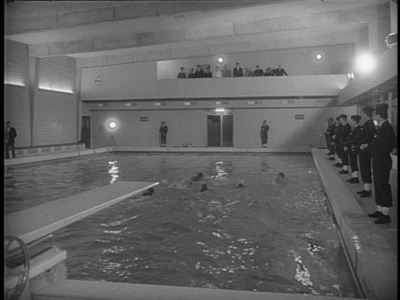
Extrapolated Question: Comment on the role of
the police force in the film, Alphaville, and discuss how it contributes
to the overall totalitarianism environment of fear and dystopia.
Alphaville is a city run by technological totalitarianism.
Cold, hard logic dominates the society, which is governed by an
authoritarian computer, incapable of emotion. People are reduced
to numbers: elements of some complex mechanical equation. Passion
and feeling are alien concepts to a machine, and any action that
it cannot comprehend using logic is considered a threat to its
authority; therefore, in Alphaville, the illogical becomes illegal.
In this society, control of the citizens is key; however, a computer,
being an inanimate object, is incapable of enforcing its will or
of dealing with dissenters, and so that function is carried out
by the city’s police force.
When Lemmy Caution first arrives in Alphaville,
the police have hidden a spy in his room to discover the nature
of his business there. Throughout the course of the film, the police
are on constant guard, monitoring the actions of each citizen as
closely as possible. When someone deviates from government policy,
armed forces capture them and bring them to a type of cell for
digital interrogation. If found guilty of illogical or emotional
behaviour, they are allowed a few final words before being publicly
executed by police forces while standing on a diving board over
a swimming pool. Divers remove each lifeless body before the next
victim in line is brought to justice. In Alphaville, the police
are shown waging a war against freedom; against art, love and individual
thought. In this way, the police in the film are developed as the
physical presence of the dictatorship which they defend, and become
symbols of both the ‘ideals’ that type of government
upholds and the methods it uses to stay in power.
The use of an autocratic style of government
is a common theme explored by dystopian writers and directors.
In addition to Jean Luc Godard's Alphaville, George Orwell’s ‘1984’,
Aldous Huxley’s ‘Brave New World’ and, more recently,
Alan Moore’s ‘V for Vendetta’ all investigate
the consequences of, and atmosphere created by, political dictatorships.
In order for such a regime to remain in control of a society, individual
identity must be compromised. Entire populations are mobilized
in support of the state and the state’s political philosophy.
Activities that do not support that government or its philosophy
are not tolerated. Freedom is given up for the common good, and
decisions left up to a state figurehead. Absolute power is maintained
through propaganda, mass surveillance and violent terror tactics:
fear is an effective way of keeping opposition silent. And though
an undercurrent of violence greatly contributes to an environment
of fear and dystopia, the real disturbing element inherent in an
autocratic government is the loss of self. When we cease being
able to make our own decisions, have our own opinions, or choose
our own destinies, we lose our identities, and our reason to live. |
|
|
| |
16. Michael
Morgan
|
|
| |
  
Throughout “Alphaville”, we see a
male dominated, logical society that outlaws irrational emotions
such as love. The removal of such emotions reduces the woman’s
role in society to a mere object of pleasure, in addition, the complete
suppression of women’s irrational emotions is synonymous with
the suppression of their personal choice and is indicative of their
enslavement in a male dominated, logical world.
The picture of the naked woman illustrates the
objectification of woman through the way she is illustrated. Her
seductive facial expression and pose combined with the idealization
of her proportions reveal a picture that uses the woman merely as
a tool to create arousal in men.
Similar themes are portrayed when the detective
is interacting with the female slave. The themes of women as slaves
and insignificant objects of pleasure are exemplified through her
role as a sexual servant for the men in the hotel. Furthermore, her
robotic communication with men is indicative of an individual who
is not allowed to express her irrational emotions. If one can never
express irrational emotions then one’s individuality is also
completely suppressed. If one’s individuality is completely
suppressed then it can be concluded that that person is a slave.
This is the case with the women in Alphaville, and is exemplified
through the behavior of the woman in the hotel.
The ideas of women as slaves and mere objects of
pleasure are played out literally when we see the women in a display
case inside the computer building. In this scene the woman is similar
to a piece of furniture meant to merely decorate a room, and her
enslavement is obvious as her day is spent sitting in a cage waiting
for men to look at her.
“Alphaville” is a film that makes a
strong connection between the complete suppression of emotions and
slavery. It also illustrates the social consequences for women if
the suppression of irrational emotions is to occur. |
|
|
| |
17. Ashley
Snell |
|
| |
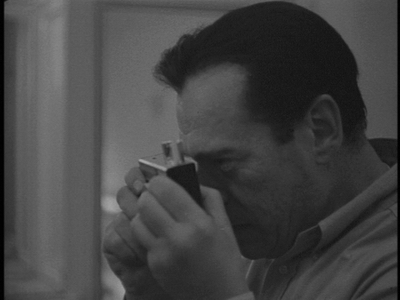 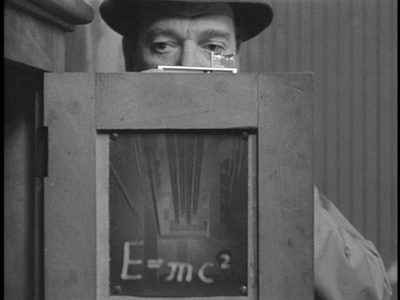 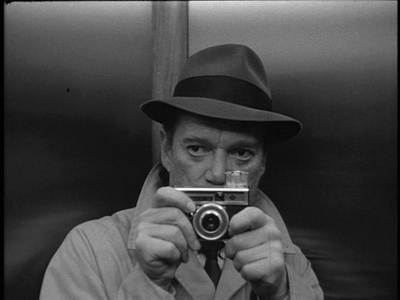
Hotel Room - Seductress | Friends Room
- seductress | Elevator – seductress
Lemmy Caution is pretending to be a reporter in
Alphaville. The camera is first seen as his way of documenting. He
is doing his ‘job’. In all three instances, his subject
being photographed is a seductress with a number branded somewhere
on her body.
There is no reference to time in the film. As discussed
in other films, there is a supposed sense of timelessness. However,
the camera can represent modern technology. The style and type of
camera could put the film in a specific time or era. Especially since
it looks so ordinary when there is this city, Alphaville, that is
being run by a computer system. One would expect a really high-tech
camera. The idea of the camera representing technology could in turn
represent Caution’s smarts.
The holding of the camera in front of his face
(although that is how it is used) could represent some of Caution’s
character traits. He is mysterious, and hiding something like why
he is actually there. The camera could be acting as a buffer between
Caution and his subjects. Too keep him from not getting involved.
In the first image, Caution is photographing a seductress that was
for him. That was as intimate as he got with the seductress.
If the camera is seen as an extension of the eye,
symbolizing the gateway to the soul, then Caution is hiding his true
feelings. He does this at first then he opens up to Natasha. (note:
I don’t remember him ever taking a photograph of Natasha) Caution
could be using the camera to try and see into the souls of others,
as well. He is trying to see the truth which could be hard to understand
from his point of view. The eye is also the place where love begins.
The people in Alphaville are deprived of real love. Caution could
be hiding his emotions and love. Again, this refers back to the buffer.
All of Caution’s photo subjects are showing some sort of affection.
The ‘truth’ he is capturing on film could help prove
that some people in Alphaville do have emotions and have feelings
of their own.
The eye, extending into the camera, can mean judgment
and authority. Caution is judging everyone in Alphaville. He could
not understand why Natasha would stay there when she knows that something
was odd. Caution’s camera represented his power as a reporter
and showed his authority over the people. For example, Caution was
able to go to the execution in the pool, which I assume not everyone
could attend. |
|
|
| |
18. Ivy
Ho
|
|
| |
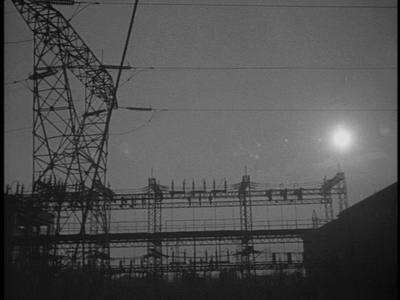 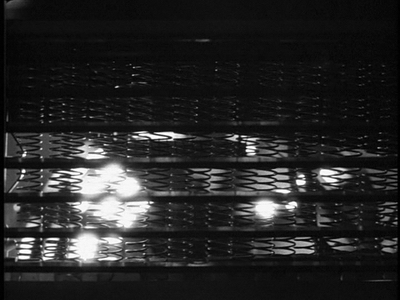 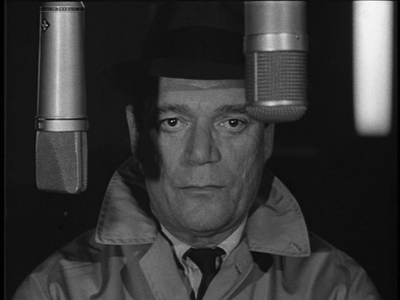
In Alphaville, mass communication is portrayed
as the tool with which a totalitarian state practices its control
over its inhabitants. At the center of the administration is the
mainframe computer, which was the epitome of modern technology
in the 1950s to 1970s. Mainframes were used mainly by large organizations
for critical applications, typically bulk data processing such
as census, industry/consumer statistics, and financial transaction
processing. The majestic size of these machines embodied a renewed
cultural belief in the power of science and logic, where cognitive
tasks can now be completed faster and more accurately by machines.
However, optimism of freedom, from repetitive data processing,
was quickly replaced by the grim forecast that humans can become
obsolete. This pessimism informs the dominating mood in Godard’s
Alphaville. It is a dark extension of an earlier era where mechanization
of factories made physical labour of humans obsolete. Behind the
dark cinematography, Godard crafts a case for the survival of humanity.
He argues that the abilities of the human mind to invent, adapt,
and be emotionally unpredictable outweigh the value of logical
thinking. This spunky “right” side of the brain is
aptly demonstrated through the relationship between language and
communication: i.e. the significance of single words, poetry, or
riddles.
Godard collaged recognizable imageries, such
as communication towers, speakers, and microphones, to create a
believable setting in which communications are mechanized. In Alphaville,
speech and words become codified, converted into electrical signals,
and deciphered by Alpha 60. For such a system to work, further
simplification is made to the language, thus, words continue to
be forbidden and forgotten to increase efficiency of data processing.
This degeneration of language into data limits the flexibility
of speech, thus, slowly eliminating the means of self expression.
The happy ending of the film demonstrates that love and poetry
may conquer all. However, without Lemmy Caution, a very convenient
hero from the outside, can the inhabitants of Alphaville awaken
from their irreversible downward spiral of cultural erasure? |
|
|
| |
19. Jonah
Humphrey
|
|
| |
  
The character, or rather ‘identity’,
of Professor Vonbraun plays a pivotal role in Jean Luc Godard’s
Alphaville, as it reveals some of the significance of the ideal,
or image of a person as a means of control, in contrast to the
notion of a ‘free’ identity. Though Vonbraun has few
scenes in the film, his character is always made present through
the repetitive shots of his portrait that seem to occupy all areas
of this futuristic dystopia. Carrying this same image with him,
the protagonist, Lemmy Caution, who himself went under a guise,
that of a ‘Mr. Johnson’, probes to unveil the history
of Professor Vonbraun. Caution reveals that the professor had formerly
been Dr. Leonard Nosferatu, but as an engineer explains, “Leonard
Nosferatu...no longer exists, Mister Johnson. The Lands Without
expelled him in 1964. Today there is only Professor Vonbraun.” It
is further revealed to the viewer, that Vonbraun was the inventor
of the Alpha 60 computer; the central controller of the entire
mega-city. It becomes clear then, that ‘identification’ is
itself, a means of control, as shown by the tattooed codes on the
necks of the brain-washed women now fulfilling the new role of ‘seductress’.
A deeper understanding of Vonbraun’s character
can be achieved by looking at the names he has adopted. Nosferatu,
is a clear reference to the vampire Nosferatu, who, like Dracula,
would hide the evil force within him from his victims, until their
trust might be gained, such that he may get close enough to feed
upon them. Further, Vonbraun, may be a reference to Werner Von
Braun—the German rocket scientist of the Second World War,
who later worked on post-war projects for the USA, demonstrating
a similar history to the film’s character of Vonbraun, as
with his own initial work for the ‘enemy’ of the ‘Lands
Without’, and subsequent coming to the aid in the formation
and rise to power of Alphaville.
In as much as the formation of the individual
may rely on the establishment of that which is inside, and that
which is outside of one’s own being, so too does the formation
of the city of Alphaville, itself, look at this divide, such that
the city becomes a rendition of a calculated mass-ego set against
the Outlands, while the inhabitants of the city are stripped of
their emotions and ultimately, their own volition, through a gradual
diminution of the dictionary’s emotive words. These seem
to be replaced throughout the film, by the continuous imagery of
Vonbraun, a symbol perhaps of the calculated perfection that Alpha
60 is trying to achieve. As with A Clockwork Orange, the
central theme of conditioning behaviour, is brought to a chilling
city-wide scale, which may counteract the somewhat trite conclusion
of ‘love conquering all’, as it suggests the members
of any society may be falling into the conditioned and controlled
identities and ideologies their government create, and they will
continue to fall so long as they remain isolated by the idealized
images of their world. |
|
|
| |
20. Aleks
Kolbas
|
|
| |
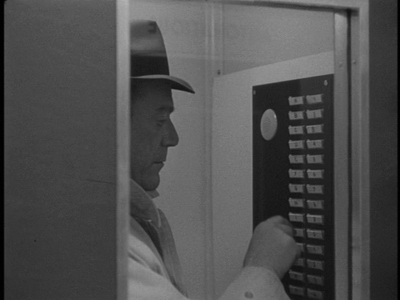  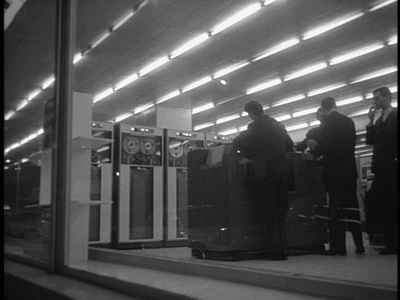
Use of keys, buttons and numbers to convey ‘touch
of a button’ technology in ‘Alphaville’
Alphaville has surrendered to the machine. From
its very environments to the people themselves, it is evident that
the prophecy of the technology has become true, eliminating all of
its adversaries and proclaiming itself at the top of the throne.
With the system gone insane, people of Alphaville no longer have
any free will and the so-called logic of the system makes all the
decisions for them. That which is inefficient or illogical is
forbidden, so there is no room for emotion, thought, or love. In
these there images, we see the characters depending on this machine
for its technological agility, for its undeniable success of becoming
a part of our lives. Although we see it as an aid to accommodate
our lives and in a way progress it, rise of technology ostensibly
jeopardizes an ability to use our instincts to make logical decisions
for ourselves. Alpha 60 has seem to take this responsibility, creating
a world in its own image, a world full of numbers and mathematical
expressions that connect in cyberspace, sort of a ‘push of
a button’ technology that has enabled itself to mutate from
outside of its wire mesh boundary into our psyche. It is too late
to stop it; apparently, we use it to make a phone call, to play a
song on the jukebox, or to simply run our computers in our offices.
These are the evidences of us being subconsciously subdued in the
world of the machine, unaware if its consequences that Godard warns
about. Godard’s dispassionate eye on 1960’s Paris presents
its environment as nothing more than a barren and desolate place,
stripped of its conscience and reason in attempt to warn its future
residents of the effects technology has when it completely takes
control of our lives, or in case of Alphaville, turns its dark side.
The world of technocracy is inevitably setting in, manifesting itself
into an image of God, an evil substitute that the citizens of Alphaville
must now warship and obey. I can almost see Alphaville as a distant
prequel to Matrix, where this newly accepted God has fully mutated
taking all that’s natural and living back to its womb of systematic
and artificial cyberspace. |
|
|
| |
21. Tavis
McAuley
|
|
| |
  
Each of the three images demonstrates the oppressive
culture of technology in Alphaville and the use of screen text to
further dehumanize the experience of watching the film. The first
still is of the elevator call button for the floor with the acronym “SS.” Although
the translation is not provided we can assume that it has something
to do with the primary function of this floor, which effectively
combines the interrogation, court and execution institutions of the
nation into one efficient floor plate.
The second image captures one of illustrations
used to convey the inner workings of vocabulary in Alphaville which
has been reduced to a very black and white “oui ou non” language.
The following computer narration accompanies similar diagrams which
show how the language in Alphaville has evolved to eliminate words
which challenge authority such as “why.”
Everything has been said provided words do
not change their meanings, and meanings their words. It is not
obvious that someone who customarily lives in a different state
of suffering requires a different sort of religion from a person
habitually in a state of well-being? Before us nothing existed
here, no one. We are totally alone here, We are unique, dreadfully
unique. The meaning of words and of expressions is no longer grasped.
An isolated word, or detail of a design can be understood but the
meaning of the whole escapes…
The clear-cut line between right and wrong is based
solely on the opinion of the Alpha 60. Because even these futuristic
computers still cannot understand human emotions, words such as “love” have
been banned from the vocabulary and as such have become taboo in
the new colony.
The third image is of a poem written by one of
the ostracized citizens who could not conform to the mechanistic
ways of the nation and used poetry as an outlet to vent this frustration.
The poem “I don’t know what, Naked truth” translates
to:
I don’t know what
Naked truth
I know it well
Despair has no wings, nor does love
No face, they do not speak
I don’t look at them
I don’t speak to them
But am as alive as my love and despair
In the post WW11 context that this film was made
(based on the novel of a similar genre), much of the technology in
society had caused pain and suffering. It is not difficult to project
the dystopic forecast of how futuristic civilization is depicted
in this film, onto today’s technologically driven society.
The personal service industry has been eroded in modern society to
a large degree, especially in sectors such as finance and the advent
of the online retail market. The lack of interest in supporting our
arts and culture have become evident today despite the growing evidence
that supports a human need for spirituality and emotion. |
|
|
| |
|
|
